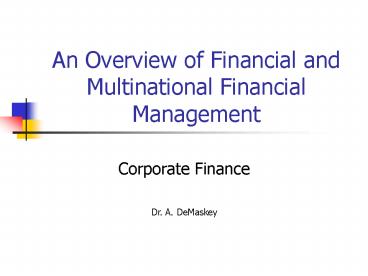An Overview of Financial and Multinational Financial Management - PowerPoint PPT Presentation
1 / 25
Title:
An Overview of Financial and Multinational Financial Management
Description:
An Overview of Financial and Multinational Financial Management Corporate Finance Dr. A. DeMaskey Learning Objectives Questions to be answered: What is the role of ... – PowerPoint PPT presentation
Number of Views:156
Avg rating:3.0/5.0
Title: An Overview of Financial and Multinational Financial Management
1
An Overview of Financial and Multinational
Financial Management
- Corporate Finance
Dr. A. DeMaskey
2
Learning Objectives
- Questions to be answered
- What is the role of financial management?
- What are the three main areas of finance?
- How are companies organized?
- What are the goals of the corporation?
- What key trends are affecting financial
management today? - What factors make multinational financial
management different? - What agency relationships exist within
corporations?
3
What three questions does financial management
seek to answer?
- What causes a company to have a particular stock
value? - How can managers make choices that add value to
their companies? - How can managers ensure that their companies
dont run out of cash while executing their
plans?
4
The Field of Finance
- Capital Markets/Financial Institutions
- Investments
- Financial Management
5
Financial Decisions Within the Firm
- Investment Decisions
- Financial Decisions
- Both
6
Financial Management and Analysis
- Financial Management
- Financial Analysis
7
Alternative Forms ofBusiness Organization
- Sole proprietorship
- Partnership
- Corporation
8
Sole Proprietorship
- Advantages
- Ease of formation
- Subject to few regulations
- No corporate income taxes
- Disadvantages
- Limited life
- Unlimited liability
- Difficult to raise capital
9
Partnership
- A partnership has roughly the same advantages and
disadvantages as a sole proprietorship.
10
Corporation
- Advantages
- Unlimited life
- Easy transfer of ownership
- Limited liability
- Ease of raising capital
- Disadvantages
- Double taxation
- Cost of set-up and report filing
11
Goals of the Corporation
- The primary goal is shareholder wealth
maximization, which translates to maximizing
stock price. - Should firms behave ethically? YES!
- Do firms have any responsibilities to society at
large? YES! Shareholders are also members of
society.
12
Goals of the Corporation
- Maximizing the owners wealth
- Maximizing shareholders wealth
- Maximizing the price per share
- Maximizing economic profits
13
Economic Profit Versus Accounting Profit
- Economic profit
- Opportunity cost
- Normal profit
- Accounting profit
- Ignores opportunity costs and normal profits
- Does not reflect the firms actual cash flows
14
Is maximizing stock price good for society,
employees, and customers?
- Employment growth is higher in firms that try to
maximize stock price. On average, employment goes
up in - firms that make managers into owners (such as LBO
firms) - firms that were owned by the government but that
have been sold to private investors
15
Is maximizing stock price good for society,
employees, and customers?
- Consumer welfare is higher in capitalist free
market economies than in communist or socialist
economies. - Fortune lists the most admired firms. In
addition to high stock returns, these firms have - high quality from customers view
- employees who like working there
16
Factors That Affect the Firms Stock Price
- Internal Factors
- Amount of cash flows expected by shareholders
- Timing of the cash flow stream
- Risk of the cash flows
- Use of debt
- Dividend policy
- External Factors
- Legal constraints
- General level of economic activity
- Tax laws
- Conditions in the stock market
- Investor expectations
17
Three Determinants of Cash Flows
- Sales
- Current level
- Short-term growth rate in sales
- Long-term sustainable growth rate in sales
- Operating expenses
- Capital expenses
18
Factors that Affect the Level and Risk of Cash
Flows
- Decisions made by financial managers
- Investment decisions (product lines, production
processes, geographic market, use of technology,
marketing strategy) - Financing decisions (choice of debt policy and
dividend policy) - The external environment
19
Financial ManagementIssues of the New Millennium
- Use of computers and electronic transfers of
information - The globalization of business
- Corporate governance
20
Agency Relationships
- An agency relationship exists whenever a
principal hires an agent to act on his or her
behalf. - Within a corporation, agency relationships exist
between - Shareholders and managers
- Shareholders and creditors
21
Shareholders versus Managers
- Managers are naturally inclined to act in their
own best interests. - But the following factors affect managerial
behavior - Managerial compensation plans
- Direct intervention by shareholders
- The threat of firing
- The threat of takeover
22
Shareholders versus Creditors
- Shareholders (through managers) could take
actions to maximize stock price that are
detrimental to creditors. - In the long run, such actions will raise the cost
of debt and ultimately lower stock price.
23
What is a multinational corporation?
- A multinational corporation is one that operates
in two or more countries. - At one time, most multinationals produced and
sold in just a few countries. - Today, many multinationals have world-wide
production and sales.
24
Why do firms expand into other countries?
- To seek new markets
- To seek new supplies of raw materials
- To gain new technologies
- To gain production efficiencies
- To avoid political and regulatory obstacles
- To reduce risk by diversification
25
What are the major factors that distinguish
multinational from domestic financial management?
- Exchange rate risk
- Currency differences
- Economic risk
- Political risk
- Government roles
- Cultural, legal, and institutional differences
- Cultural differences
- Language differences
- Legal differences































